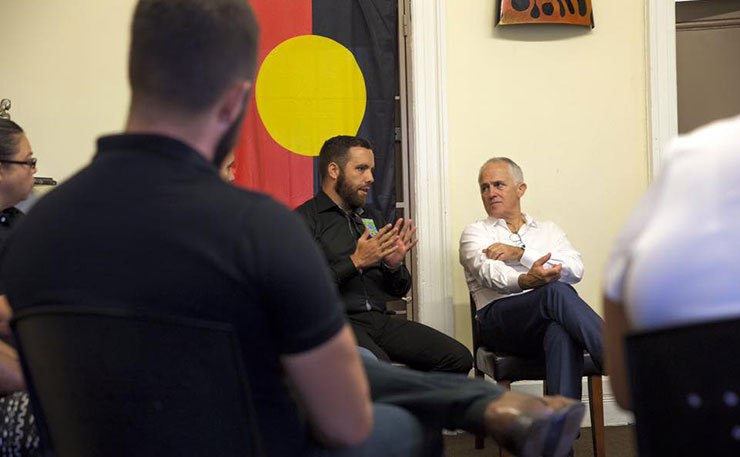OPINION: A radical plan to change how funding for Indigenous Affairs is distributed has seen millions of dollars stripped from the area by two Prime Ministers who talked big on Closing the Gap. A new Senate report makes one thing clear: Indigenous communities and organisations are still being ignored, writes Rachel Siewert.
Recently, Prime Minister Malcolm Turnbull delivered the annual Closing the Gap speech that talked ambitiously of closing the gap for Aboriginal and Torres Strait Islander peoples. Later, wiping tears from his eyes, he told the story of an Aboriginal mother singing a lullaby to her child. To NITV journalist Stan Grant, he spoke of the Stolen Generations and a loss of culture, he said: “The thing that’s so sad is to imagine that mother singing that story to her, you know, it a time when you were losing culture, and the last thing that baby was, was safe”.
Although not claiming to be the Prime Minister for Indigenous Affairs like his predecessor, Turnbull perpetuated an interest in reducing disadvantage for our First Peoples.
It wasn’t long until Mr Turnbull’s rhetoric began to unravel, Aboriginal leaders who have requested to meet since last year told media “we want a meeting with Mr Turnbull, not his tears”. After a strong public campaign by the National Congress of Australia’s First Peoples the Prime Minister’s office finally agreed to a meeting this week.
Yet for the Aboriginal and Torres Strait Islander community, this failure to meet with leaders as a matter of priority is just the tip of the iceberg.
While Tony Abbott promised to Close the Gap, he ripped over half a billion dollars from Aboriginal and Torres Strait Islander services. Under Abbott-Turnbull leadership, the roll out of those services has caused incredible stress to the Aboriginal community and service providers at a national scale.
In the 2014-15 budget Tony Abbott announced that all of the government’s programs, grants and activities for Aboriginal and Torres Strait Islander peoples would be ‘rationalised’ and ‘streamlined’ under the new Indigenous Advancement Strategy (IAS). From July 1, 2015, 150 programs delivered across government portfolios were consolidated into five IAS funding streams.
What followed was a rollout – best described as chaos – that has had a disastrous impact on the delivery of Aboriginal services and therefore the wellbeing of people accessing those services. The dysfunction of the rollout created uncertainty and upset across the board. Social Justice Commissioner, Mick Gooda, explained that “…the changes have meant deep cuts, uncertainty, stress and anxiety for Aboriginal and Torres Strait Islander peoples”.

In response to this unrest, and repeated calls from the community, I initiated a national Senate inquiry into the rollout of the Strategy that took place over 2015-16. The inquiry’s report was tabled in the Senate on Wednesday and outlines many of the issue while making recommendations for the future.
The government’s refusal to provide a list of organisations completely defunded made it hard to work out gaps in services that are critical to wellbeing. Although some key gaps quickly became apparent, such as youth services in central Australia, more were soon identified including women’s domestic violence and homeless shelters.
Some organisations and serviceshave managed to get funding through the government’s ad-hoc approach to gap filling, which is of course welcome nonetheless. One example was the domestic violence shelter – Djarindjin safe house – in the Dampier Peninsula. The shelter services 50 Aboriginal communities 200km north of Broome and was knocked back for funding. Yvonne Sampi spoke to the media about her experiences, and said:
“It was very hard, because I had to protect the kids first and protect myself later. The kids had to run away to family members, while I used to get beaten. Family knew about it, because I wouldn’t be home to see my family for a couple of days because I was beaten up too much.”
The shelter was essential for the safety of women in this area, and the IAS process let these women down, as well as others across the country.
Anyone caught up in the roll-out of the IAS would find the plight of the Djarindjin safe house unsurprising. The struggle does not stop with organisations completely defunded, many organisations lost some of their funding, or groups that only secured funding for one year. The Lyndon Community said:
“The provision of a one-year funding agreement will make the process of recruiting new staff difficult and challenging, as there will be little enticement for experienced staff to give up more permanent positions or relocate.”
Ms Collins, Deputy Chair for a peak Aboriginal Legal Service – speaking at a recent hearing in Darwin – highlighted the on-going problems of the IAS:
“No-one is telling us anything. I have four months left and I have staff contracts that run out at that time. If I have to let staff go, I will guarantee that we will be cutting our services and that is going to have a huge impact on the court system. This is what the Indigenous Advancement Strategy was for. We find the whole process totally disappointing and unprofessional.”
Anxiety for organisations in the Aboriginal sector because of short funding agreements is an ongoing struggle for those employed in this space and those accessing the service. There’s nothing to be gained from rolling out short-term funding arrangements charged with uncertainty. Longer contracts should be awarded to ensure stability so that organisations can plan and deliver sustainable services to their communities.
As well as defunding essential services, evidence to the inquiry showed the competitive tendering process to apply for funding favours large, non-Aboriginal organisations. Considering we know that decision making and self-determination are key to reducing Aboriginal disadvantage, this beggars belief. The Central Land Council noted:
“The Aboriginal controlled organisations delivering these services are not only best suited for doing so, but provide the priority outcomes that the government is seeking in terms of sustainable Aboriginal employment as well as experience and engagement in governance and management, and the development of community self-reliance and responsibility”.

It is imperative that future tender rounds are not blanket competitive processes and are underpinned by robust service planning. It is also important the future decisions on funding factor in the contribution and effectiveness of Aboriginal and Torres Strait Islander organisations.
There was unrelenting confusion over the application process and long delays in making funding decisions. Overwhelmingly, organisations received short notice on application deadline, as well as fractured/low-level support. Ms Collins said:
“It was the most disappointing, frustrating process. I was ringing them and they were saying, ‘Yes, from now on you apply for Stronger Futures,’ and you had a conversation for half an hour and, at the end of it, the person would say, ‘Can you explain to me what Stronger Futures is?’ You would ask, ‘Are you the Territory representative?’ and they would say yes, and you would say, ‘And you don’t know about Stronger Futures?’ That is when we started having panic attacks, thinking, ‘These people have no idea what they’re doing’.”
In light of the failures of the IAS the government did undertake some consultation last year on what people thought about the flawed process. They will apparently be releasing some new guidelines in the near future but there has been no consultation on a draft – nor, I understand, will there be. Once again, Aboriginal and Torres Strait Islander peoples will be faced with a fait accompli.
More than ever, it’s time for Malcolm Turnbull to act on his rhetoric about Closing the Gap and reverse the huge cuts made by Tony Abbott in recent budgets. Many have shed tears over the ongoing struggles of our First Peoples, Malcolm Turnbull has the power to do something about it.
Donate To New Matilda
New Matilda is a small, independent media outlet. We survive through reader contributions, and never losing a lawsuit. If you got something from this article, giving something back helps us to continue speaking truth to power. Every little bit counts.





